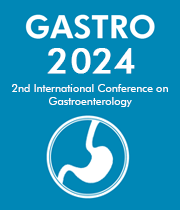Title : Peptidase inhibitor 3 (PI3) contribution to risk of celiac disease. Functional characterization of polymorphisms in the PI3 gene
Abstract:
Celiac Disease(CD) is an autoimmune condition resulting from gluten sensitivity in genetically predisposed individuals. It is a multifactorial disorder in which genetic, environmental, and immunological factors converge to determine the gluten sensitivity observed in affected patients. Peptidase inhibitor 3 [PI3]) and its biologically active precursor, pre-elafin, are neutrophil serine proteinase inhibitors with an important role in preventing excessive tissue injury during inflammatory events. PI3 is constitutively produced by the epithelium, its expression is regulated by inflammatory and possesses an amino-terminal transglutaminase substrate domain and has been identified as a substrate for tissue transglutaminase TG-2 cross-linking. This study investigated the hypothesis that PI3-kinase pathway is dysregulated in celiac disease.
Methods:
A total of 96 study participants, including 58 celiac patients and 38 healthy individuals, were included in this study. The diagnosis was confirmed through serological tests using tissue transglutaminase (tTG) antibodies and specific HLA typing for CD. Additionally, biopsy of the small intestine was performed after gastrointestinal endoscopy. Paraffin sections were deparaffinized in xylene, followed by hydration through graded alcohols. We used the following antibody: anti human elafin/ESI antibody Contains 1 WAP domain. Also, we determined the levels of soluble PI3 in serum of active celiac and non-celiac patients using a commercial ELISA kit. PCR Amplification of PI3 Genomic DNA was isolated from whole blood samples of the study subjects. One product was 870 bp in length and contained two SNPs of interest (rs1733103 and rs41282752), while the other product was 463 bp and contained the last SNP of interest for the study (rs2664581), corresponding to exons 1 and 2 of PI3, respectively.
Results:
We found strong PI3 expression in lamina propria cells like lymphocytes and in epithelial cells in CD. The expression pattern showed expression both in the surface epithelium as well as in crypt cells. The levels of PI3 significantly decrease in the serum of patients with UC compared to healthy patients, showing values similar to those found in patients with Crohn's disease. The association study of the genotypes obtained due to the variant allele of rs1733103 was significantly associated with increased CD risk. In contrast to these results, we did not observe a significant risk association between variant allele rs41282752 SNPs and CD. The variant allele of rs2664581 (C) was associated with increased CD risk although it has not reached significance. Our results confirm the association between SNPs rs173310, rs2664581 and enhanced risk of CD, further supporting the role of PI3 in CD development. SNPs in the PI3 locus may act synergistically by regulating PI3 gene expression and pre-elafin biological functions.
Conclusions:
We propose that alternative splicing of PI3 may be part of another link in the complex pathophysiology that occurs in each CD patient, and there is a differential regulation of PI3 splicing variants in CD. As a result of this abnormal splicing, a higher level of defective PI3 protein is generated, which cannot provide sufficient protection against the harmful effects of cytokines, triggering tissue damage developed by autoimmunity in CD.



